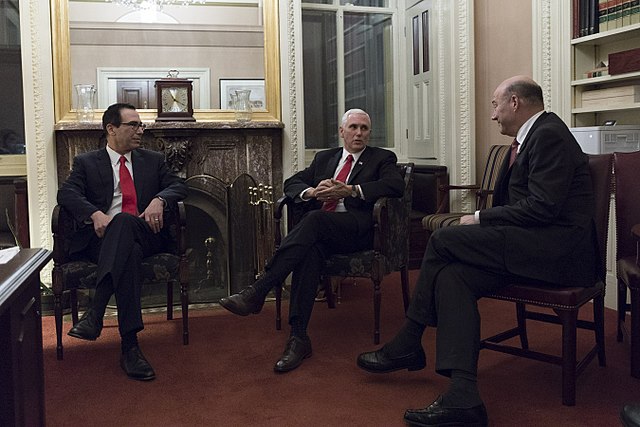“Corporations zeroing out their tax bills or paying single-digit federal tax rates mean a substantial loss in federal revenue. Calls to cut critical programs and services in the wake of these corporate tax cuts are absolutely connected.”
By Eoin Higgins, staff writer for Common Dreams. Published 4-11-2019

Steve Mnuchin, Mike Pence and Gary Cohn watching the Senate vote on the 2017 tax bill. Photo: White House
A new analysis out Thursday shows that tax policy under the Trump administration is benefitting large corporations to such a degree that twice as many large companies will pay nothing in federal taxes for 2018 compared to previous years.
The report by the Institute on Taxation and Economic Policy, which comes less than a week before tax day in the United States on April 15, found that 60 companies—including Amazon, Netflix, Activision Blizzard, General Motors, and IBM—used “a diverse array of legal tax breaks” to bring their federal tax liability to zero.
“For years, corporations have manipulated the system to avoid paying taxes, and it’s clear that the 2017 tax law did nothing to change this,” said Matthew Gardner, a senior fellow at ITEP and lead author of the report.
See the complete list of U.S. companies which paid “not a dime” in federal taxes last year here.
“In many cases, American taxpayers are subsidizing THEM,” writer David Beard noted on Twitter.
Here’s a list of some of the biggest profitable companies not paying federal taxes. In many cases, American taxpayers are subsidizing THEM. https://t.co/wecVJWKCf0 pic.twitter.com/GY6n6MHiQR
— David Beard (@dabeard) April 11, 2019
As IETP said in a statement announcing the study’s results:
The tax-avoiding corporations are some of the most profitable, recognizable companies in the world, and they represent a variety of industries, including technology, energy and gas, financial services, aviation, pharmaceutical and manufacturing. Earlier this year, ITEP reported Netflix and Amazon paid no federal taxes. Other companies on this list include Chevron, Delta Airlines, Eli Lilly, General Motors, Gannett, Goodyear Tire and Rubber, Halliburton, IBM, Jetblue Airways, Principal Financial, Salesforce.com, US Steel, and Whirlpool.
These companies avoided taxes by employing a variety of legal tax breaks. Accelerated depreciation allows companies to write off the cost of their investments much faster than these investments wear out. This break accounted for hundreds of millions in tax write-offs. Chevron alone, for example, reported $290 million in accelerated depreciation, and Halliburton reported $320 million.
According to the institute, U.S. lawmakers “interested in enacting true tax reform should critically assess the costs of each of existing tax break—including those discussed in this report—and take steps to ensure that profitable corporations pay their fair share of U.S. taxes.”
One of those lawmakers is Sen. Elizabeth Warren (D-Mass.)—a Democratic presidential candidate for the 2020 election—who on Thursday released her Real Corporate Profits Tax bill. The proposed legislation would impose a flat 7 percent tax on American corporations with profits over $100 million, as Common Dreams reported.
“Some of the biggest corporations in the country make huge profits but pay zero federal corporate income taxes on those profits,” Warren said in a Medium post explaining the bill.
Gardner explained to the Center for Public Integrity and NBC News that the Trump tax cuts in 2017—which dropped the corporate tax rate from 35% to 21%—are the main driver behind both the reduction in corporate taxes for 2018 and the increase in companies paying nothing.
“The specter of big corporations avoiding all income taxes on billions in profits sends a strong and corrosive signal to Americans,” said Gardner, “that the tax system is stacked against them, in favor of corporations and the wealthiest Americans.”
Still, the money has to go somewhere. Adam Smith, a campaign finance advocate, had an idea of where that he shared on Twitter.
“I wonder how many lobbyists these companies pay for each year,” said Smith.
I wonder how many lobbyists these companies pay for each year. https://t.co/QJrAYw3Nyr
— Adam Smith (@asmith83) April 11, 2019
What’s clear to Gardner is that the loss of federal revenue is not without far-reaching repercussions.
“We cannot pretend that corporate tax avoidance has no cost,” said Gardner. “Corporations zeroing out their tax bills or paying single-digit federal tax rates mean a substantial loss in federal revenue. Calls to cut critical programs and services in the wake of these corporate tax cuts are absolutely connected.”

